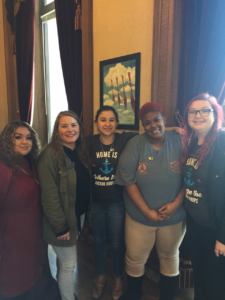For the past 12 months, Anchor Communities have been working hard to achieve quality, real-time data. To reach this milestone, communities must create ways for youth and young adults to provide feedback on their experience accessing systems. In Pierce County, the Core Team created a special committee to work on this task, consisting of Angel, Brianna, and Zaira, three young people with lived experience, and iLeana, The Mockingbird Society’s Youth Engagement Coordinator. Together, they created a new process from start to finish to gather feedback.
“Being involved from the beginning of the project is essential to calling our process co-design,” Angel said. “Everyone’s perspective matters.”
The team worked on a survey to provide young people a safe space to provide their feedback. To begin, they drafted survey questions and worked with young people at the REACH Center GED program to review their questionnaire. This gave the team guidance on how to ask the questions in a way that young people would feel comfortable providing honest feedback. Then, the team developed multiple methods to distribute the survey:
- The team started with a computer survey. However, some young people had difficulty focusing or reading from the computer, so other methods were developed.
- Young people were hired to ask the survey questions in person. This helped young people in crisis feel supported throughout the process.
- Staff who interact with young people for the Coordinated Entry process were trained on the survey so they could also collect information when possible.

This entire process was led by Angel, Brianna, and Zaira. They were responsible for every detail of the project, from typing up the questionnaire to developing the survey distribution methods. iLeana supported them as needed to keep the project moving, providing coaching on matters like meeting deadlines. This approach helped Angel, Brianna, and Zaira nurture their leadership skills and take full ownership over the project’s outcome.
“It was very valuable for me to have accountability in my projects, like in creating this survey, because it lets me own my own mistakes and successes,” Zaira said.
After gathering responses, the team’s key insights from the survey were:
- Youth and young adults need easier access to programs that teach independent living skills
- Young people who are couch-surfing do not always qualify for resources even though they need support to access basic necessities
Our Anchor Communities value co-development of projects with youth and young adults, and this project demonstrates why this is such an important value. Youth and young adults experiencing homelessness navigate these systems every day, and we need their expertise to truly understand what’s working and what’s not. Our work needs to intentionally engage young people on a regular basis, so we rely on current and relevant insights.
“Youth need a seat at the table, and they need to be heard at the table,” Brianna said. “We need to be involved from the beginning of the process, we need to be involved in the design of solutions, and these opportunities need to be compensated and accessible for young people.”
Our partnerships with young people with lived experience are one of the reasons we believe the Anchor Community Initiative is the right approach to ending youth and young adult homelessness. With young people’s wisdom, we know we can arrive at the right solutions.

Leave a Reply